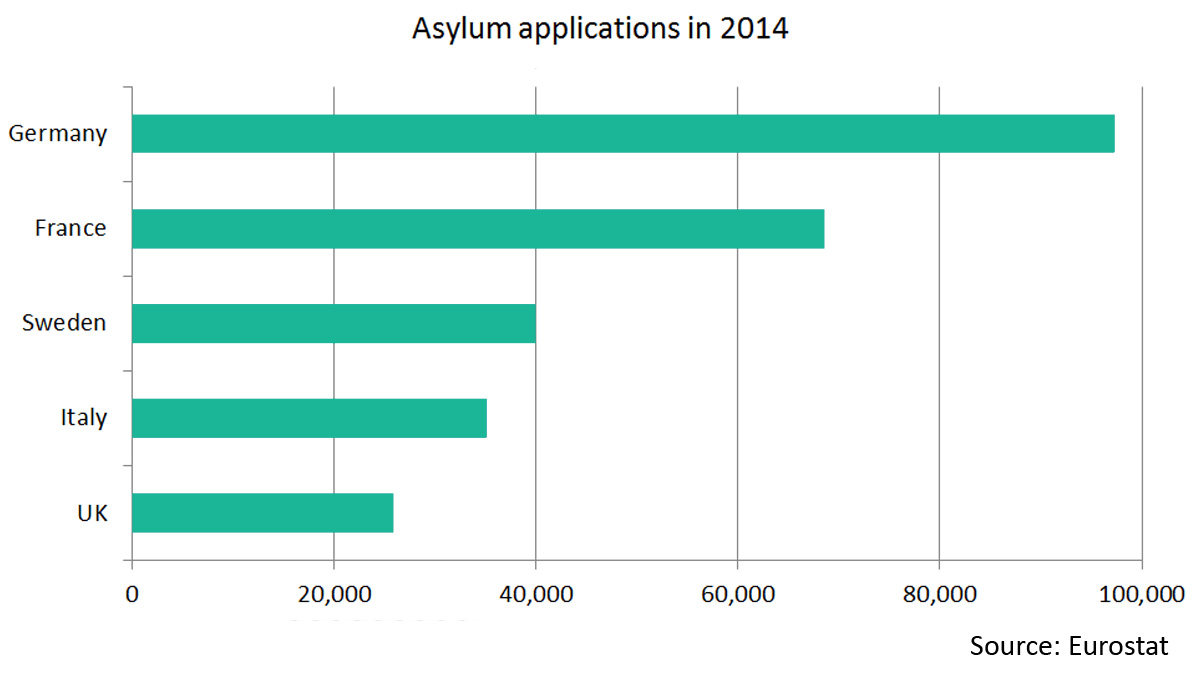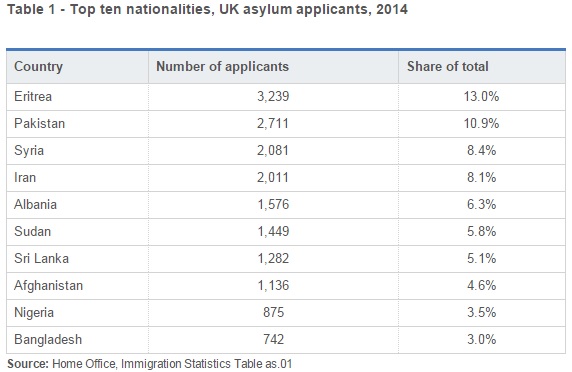Refugees in Britain: the facts behind the headlines
Debunking the myths that Britain is a refugee magnet and asylum seekers are a burden on the state

A free daily email with the biggest news stories of the day – and the best features from TheWeek.com
You are now subscribed
Your newsletter sign-up was successful
Britain is coming under increasing pressure to respond to the humanitarian crisis in Europe and open its doors to more refugees. There are also growing calls to confront the myths and negative stereotypes spread about refugees by politicians and the press.
David Cameron sparked outrage last month after referring to refugees in Calais as "swarms", while a survey conducted on behalf of the British Red Cross found that the words people most associate with media coverage of refugees and asylum seekers are "illegal immigrants" and "scroungers".
We need to have an urgent debate about how to solve the growing global refugee crisis, writes political activist and journalist Owen Jones in The Guardian. "But to do it properly, we need to at least have the facts right – and stop indulging in the myth[s]."
The Week
Escape your echo chamber. Get the facts behind the news, plus analysis from multiple perspectives.

Sign up for The Week's Free Newsletters
From our morning news briefing to a weekly Good News Newsletter, get the best of The Week delivered directly to your inbox.
From our morning news briefing to a weekly Good News Newsletter, get the best of The Week delivered directly to your inbox.
Some of the most common myths include:
Britain will let anyone in
The UK's asylum system is one of the toughest in the world and the majority of asylum applications are turned down by the Home Office. On average, Britain only grants refugee status to about 40 per cent of people. Applicants are required to provide "credible evidence" of their situation and proof of their persecution when fleeing their country.
Britain is a refugee magnet
A free daily email with the biggest news stories of the day – and the best features from TheWeek.com
Calais mayor Natacha Bouchard once dubbed Britain the "El Dorado for refugees" – but experts agree this is far from the reality. Out of the hundreds of thousands of migrants who reach Europe from Africa and the Middle East, only a tiny minority want to come to the UK and even fewer go on to attempt the journey across the Channel, writes Jonathan Portes, director of the National Institute of Economic and Social Research, in The Guardian.
Last year, only 24, 914 people attempted to claim asylum in Britain, compared to 97,275 in Germany, according to the Migration Observatory. This year, Berlin expects that number to rise to 800,000 and it could even reach one million. Out of the four million refugees who have fled the ongoing war in Syria, Britain has welcomed just 215. Turkey, by comparison, opened its doors to 1.8m despite having a GDP per capita roughly four times less than that of Britain.

Asylum seekers are a drain on the economy and the welfare system
One of the more common myths is that people claiming asylum in Britain receive large handouts from the state. In reality, they are not entitled to council accommodation and are given little government support – sometimes just £5 per day. "Far from having an easy ride, refugees and asylum seekers often face severe difficulties once they arrive in the UK," says the British Red Cross. They are not allowed to work until they have been granted asylum – a process that can take anywhere between a few months to several years – which leaves them vulnerable to exploitation.
"Asylum seekers do not come to the UK to claim benefits. In fact, most know nothing about welfare benefits before they arrive and had no expectation that they would receive financial support," says the British Refugee Council. Most asylum seekers who came to the UK told the Refugee Support Network that they had no expectation of being provided with financial support; all they wanted was to reach a place of safety.
Far from a being a drain on the economy, refugees have long made an enormous cultural, social and economic contribution to Britain. About 1,200 medically qualified refugees are recorded on the British Medical Association's database and even the most quintessentially "British" institutions – like fish and chips and the Marks & Spencer retail empire – were brought to the UK by refugees.
The number of refugees in Britain is soaring
"Despite the hysteria, the number of refugees in Britain is actually falling," says The Guardian. Britain's Refugee Council reports that numbers have dropped by 76,439 in the last four years. Comparatively, the proportion of refugees in developing countries has risen from 70 to 86 per cent in the past decade. A poll conducted by the think tank British future in 2012 revealed that half of Britons thought that more than ten per cent of people in the country were refugees. One in 20 believe that the majority of the British population are refugees. The true figure is less than one per cent.[[{"type":"media","view_mode":"content_original","fid":"84207","attributes":{"alt":"","class":"media-image","height":"571","style":"font-size: 0.8125em;","width":"800"}}]]
There are lots of "bogus asylum seekers"
There are many who wrongly confuse asylum seekers with economic migrants who have made the choice to travel to Britain in search of work. The vast majority of people arriving in Europe and claiming asylum in the UK are Syrian. Many others have fled civil war, violence and oppression in countries like Eritrea, Afghanistan, Iraq and Somalia. "Legally and morally, they are not illegal immigrants, still less 'bogus asylum seekers'," says Portes.

Hope Hanlon, the former UK director for the UN High Commission for Refugees once urged "the average British person" to recognise that refugees are normal, ordinary people who have been forced to flee unimaginable circumstances. "They are just trying to reach out to the British public," she said, "and we hope that the British public would grasp the hand that is being extended."
-
 5 calamitous cartoons about the Washington Post layoffs
5 calamitous cartoons about the Washington Post layoffsCartoons Artists take on a new chapter in journalism, democracy in darkness, and more
-
 Political cartoons for February 14
Political cartoons for February 14Cartoons Saturday's political cartoons include a Valentine's grift, Hillary on the hook, and more
-
 Tourangelle-style pork with prunes recipe
Tourangelle-style pork with prunes recipeThe Week Recommends This traditional, rustic dish is a French classic
-
 How corrupt is the UK?
How corrupt is the UK?The Explainer Decline in standards ‘risks becoming a defining feature of our political culture’ as Britain falls to lowest ever score on global index
-
 The high street: Britain’s next political battleground?
The high street: Britain’s next political battleground?In the Spotlight Mass closure of shops and influx of organised crime are fuelling voter anger, and offer an opening for Reform UK
-
 ‘These accounts clearly are designed as a capitalist alternative’
‘These accounts clearly are designed as a capitalist alternative’Instant Opinion Opinion, comment and editorials of the day
-
 Is a Reform-Tory pact becoming more likely?
Is a Reform-Tory pact becoming more likely?Today’s Big Question Nigel Farage’s party is ahead in the polls but still falls well short of a Commons majority, while Conservatives are still losing MPs to Reform
-
 Memo signals Trump review of 233k refugees
Memo signals Trump review of 233k refugeesSpeed Read The memo also ordered all green card applications for the refugees to be halted
-
 Trump limits refugees mostly to white South Africans
Trump limits refugees mostly to white South AfricansSpeed Read The administration is capping the number of refugees at 7,500
-
 Taking the low road: why the SNP is still standing strong
Taking the low road: why the SNP is still standing strongTalking Point Party is on track for a fifth consecutive victory in May’s Holyrood election, despite controversies and plummeting support
-
 Syria’s strange post-Assad election
Syria’s strange post-Assad electionThe Explainer Sunday’s limited vote ‘suited the phase Syria is undergoing’, says interim president